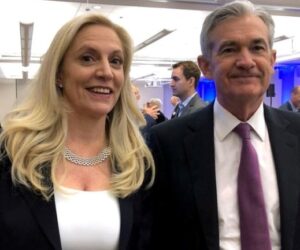Biden keeps Powell as Federal Reserve boss; Brainard to get vice-chair slot. Both support letting inflation run “hot.”
Since 2010, the Federal Reserve has pursued “loose” or “accommodative” monetary policies that kept the economy afloat during the financial crisis, Great Recession, and pandemic.
Fine as far as it went, but it may have gone too far.
These policies primarily benefited shareholders and borrowers, contributed to widening wealth inequality, and hurt savers (especially retirees). And many economists believe the Fed’s pandemic response overshot and put too much money in circulation, exacerbating the inflation resulting from pandemic-caused labor and supply shortages.
Powell was originally an Obama appointee, and elevated to Fed chairmanship by Trump, then earned Trump’s ire by acting professionally instead of as a loyal lackey manipulating Fed policy for Trump’s political benefit.
Brainard, who rose under the Obama administration, was preferred for the job by progressives like Sen. Elizabeth Warren because she’s considered tougher on bank regulation. However, the Fed’s top regulator job will now go to someone else.
The Federal Reserve has been the primary driving force behind rising stock prices and home prices. Ultra-low interest rates pushed money into stocks, and its massive purchasing of mortgage securities boosts housing demand by keeping mortgages cheap and readily available.
The Fed’s current policy track calls for gradually “tapering” these bond purchases to zero by June 2022, and then the Fed may begin to slowly raise interest rates to tamp down inflation later next year, but many critics say the Fed is behind the curve and responding to inflation too slowly.
The Fed’s policies are highly consequential for what’s happening in the economy. Almost nothing else has similar influence. The Fed’s policies have bolstered the economy, but also create market distortions and are laden with “moral hazards” (e.g., rewarding borrowers and punishing savers).
These appointments — which probably will sail through Senate confirmation — imply more of the same. But no one expected a major shift in Fed priorities or policies, so it came as no surprise to Fed watchers or financial markets.
